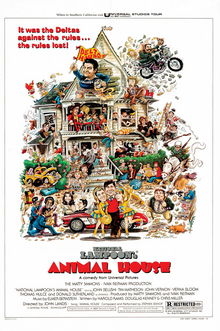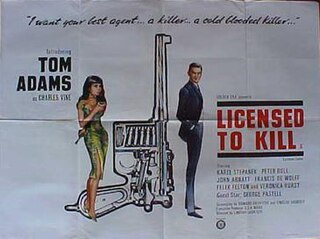Related Research Articles

Vellum is prepared animal skin or membrane, typically used as writing material. It is often distinguished from parchment, either by being made from calfskin, or simply by being of a higher quality. Vellum is prepared for writing and printing on single pages, scrolls, and codices (books).

Animal Crackers is a 1930 American pre-Code Marx Brothers comedy film directed by Victor Heerman. The film stars the Marx Brothers,, with Lillian Roth and Margaret Dumont, based on the Marxes Broadway musical of the same name. Mayhem and zaniness ensue during a weekend party in honor of famed African explorer Captain Jeffrey T. Spaulding. A critical and commercial success upon its initial release, Animal Crackers was shot at Paramount's Astoria Studios in Astoria, Queens, the second film the Brothers would make in New York City.

National Lampoon's Animal House is a 1978 American comedy film directed by John Landis and written by Harold Ramis, Douglas Kenney and Chris Miller. It stars John Belushi, Tim Matheson, John Vernon, Verna Bloom, Thomas Hulce and Donald Sutherland. The film is about a trouble-making fraternity whose members challenge the authority of the dean of the fictional Faber College.
A snipe hunt is a type of practical joke or fool's errand, in existence in North America as early as the 1840s, in which an unsuspecting newcomer is duped into trying to catch an elusive, nonexistent animal called a snipe. Although snipe are an actual family of birds, a snipe hunt is a quest for an imaginary creature whose description varies.
A hide or skin is an animal skin treated for human use. The word "hide" is related to the German word Haut, which means skin. The industry defines hides as "skins" of large animals e.g. cow, buffalo; while skins refer to "skins" of smaller animals: goat, sheep, deer, pig, fish, alligator, snake, etc. Common commercial hides include leather from cattle and other livestock animals, buckskin, alligator skin and snake skin. All are used for shoes, clothes, leather bags, belts, or other fashion accessories. Leather is also used in cars, upholstery, interior decorating, horse tack and harnesses. Skins are sometimes still gathered from hunting and processed at a domestic or artisanal level but most leather making is now industrialized and large-scale. Various tannins are used for this purpose. Hides are also used as processed chews for dogs or other pets.

An exploitation film is a film that tries to succeed financially by exploiting current trends, niche genres, or lurid content. Exploitation films are generally low-quality "B movies", though some set trends, attract critical attention, become historically important, and even gain a cult following.
"Kamp Krusty" is the fourth season premiere of the American animated television series The Simpsons, and the 60th episode overall. It originally aired on the Fox network in the United States on September 24, 1992. In the episode, the children of Springfield attend Kamp Krusty, a summer camp named after Krusty the Clown. The camp is extremely unpleasant, leading to the campers rebelling against the camp director. Meanwhile, with the kids away, Homer and Marge enjoy more time together, and Homer becomes physically and emotionally healthier.

John Keith Vernon was a Canadian actor. He made a career in Hollywood after achieving initial television stardom in Canada. He was best known for playing Dean Wormer in Animal House, the Mayor in Dirty Harry and Fletcher in The Outlaw Josey Wales.

Meatballs is a 1979 Canadian comedy film directed by Ivan Reitman. It is noted for Bill Murray's first film appearance in a starring role and for launching the directing career of Reitman, whose later comedies include Stripes (1981) and Ghostbusters (1984), both starring Murray.

Colleen Celeste Camp is an American character actress and producer. After appearing in several bit parts, she had a lead role in the comedy The Swinging Cheerleaders (1974), followed by roles in two installments of the Police Academy series. Camp had supporting roles in Lady of the House (1978), Apocalypse Now (1979), and The Seduction (1982), after which she played Julie’s mother in Valley Girl and Yvette the Maid in the 1985 comedy Clue.
The women in prison film is a subgenre of exploitation film that began in the early 20th century and continues to the present day.

Gorp is a 1980 American comedy film starring Michael Lembeck and Dennis Quaid, and featuring early acting work of Rosanna Arquette and Fran Drescher in supporting roles. Directed by Joseph Ruben, with both story and screenplay by Jeffrey Konvitz and A. Martin Zweiback, the film follows in the tradition of the 1978 fraternity comedy National Lampoon's Animal House, and the 1979 summer camp comedy film Meatballs. Gorp was the penultimate film released by American International Pictures, before How to Beat the High Cost of Living two months later.
Cheap Imitation is a piece for solo piano by John Cage, composed in 1969. It is an indeterminate piece created using the I Ching and based, rhythmically, on Socrate by Erik Satie.

Licensed to Kill is an Eastmancolor 1965 superspy imitation James Bond film starring Tom Adams as British secret agent Charles Vine. It was directed and co-written by Lindsay Shonteff. Producer Joseph E. Levine picked it up for American and worldwide distribution and reedited it under the title The Second Best Secret Agent in the Whole Wide World.

The Green Cockatoo is a 1937 British drama film directed by William Cameron Menzies and starring John Mills, Rène Ray, and Robert Newton. It was adapted from a story by Graham Greene and shot at Denham Studios. It tells the story of an innocent young woman who arrives in London looking for work and, pursued by both criminals and police, is involved in a headlong series of fights and flights.
Not Without My Handbag is a 1993 British stop-motion animated comedy horror short film created by animator Boris Kossmehl at Aardman Animations. The film is about a deceased aunt who forgets to take a proper handbag on her journey to Hell.
Roberta Friedman is a filmmaker and video artist. She has worked on projects ranging from the commercial, such Star Wars and Ragtime, to the experimental, such as her video The Erl King, created in collaboration with Grahame Weinbren, the first interactive art piece acquired by the Guggenheim Museum for its permanent collection.
Manson International was an independent American film production company and distributor. The name was derived from the founders' surnames. Initially a distributor of foreign films, it became one of the pioneer film sales agencies in the country.
References
- 1 2 Donahue, Suzanne Mary (1987). American film distribution : the changing marketplace. UMI Research Press. p. 296. Please note figures are for rentals in US and Canada
- ↑ "Summer Camp only cheap imitation of Animal House humour". Calgary Herald. 11 May 1979. p. 29.